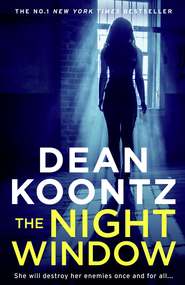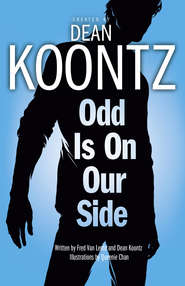По всем вопросам обращайтесь на: info@litportal.ru
(©) 2003-2025.
✖
Your Heart Belongs to Me
Автор
Год написания книги
2019
Настройки чтения
Размер шрифта
Высота строк
Поля
Able to hear nothing above the noise of his treacherous heart, Ryan became convinced that someone approached, someone whose vision was as keen in this perfect gloom as was the vision of a cat prowling in moonlight. He waited for a hand to be laid on his shoulder, or for a stranger’s cold fingers to be pressed against his lips.
The weight of his heart insisted that he sit on the floor. His knees buckled, and he slid down the face of a cabinet, the drawer pulls gouging his back.
Minutes passed during which the riot in his breast failed to accelerate into full-blown anarchy, and in fact gradually a normal beat was reestablished, a measured rhythm.
His weakness abated, and with the return of his strength, his fear soured into humiliation.
The drawer pulls became handholds by which Ryan drew himself to his feet. He felt his way through the clinging darkness to the swinging door.
There he listened to the kitchen. No murmurs, no whispers, no clink or ping, no soft but ominous grinding noise.
He passed through the door, eased it shut, and stood with his back to it.
To his right, above the primary sinks and the flanking counters, were windows facing west. The glow of the Newport Beach lowlands and the moon above the sea defined the panes.
He dared the light switch and found that he was alone.
In addition to the door to the pantry, the big kitchen had three other exits: the first to a patio, the second to the breakfast room, and the last to the back hall. The breakfast room also offered a door to the patio and another to the hallway.
Surely, the voices had been those of Lee and Kay. They had been engaged on some mundane task, unaware that he was in the butler’s pantry.
But with Ryan supposedly asleep in his bedroom one floor above and at the farther end of the big house, why had the Tings been whispering?
At each end of the kitchen, as at other points throughout the house, Crestron panels were embedded in the wall. He touched one, and the screen brightened. From this, he could control the lighting, the through-house audio, the heating and cooling, and other systems.
He selected the security display and saw that according to established routine, the Tings had engaged the perimeter alarm. No intruders could have entered the house without triggering a siren and a recorded voice identifying the breach point.
Twenty exterior cameras provided views of the grounds. He cycled through them. Although the night-vision technology offered different clarity from camera to camera, depending on ambient-light conditions, he saw no prowlers on his property, no motion other than the darting paleness of an occasional moth.
He returned to the master suite, but not to bed. In an alcove, off the sitting room where he had taken dinner, stood an amboina-wood Art Deco desk, circa 1928. He sat there, but not to work.
Lee and Kay Ting had been employed here two years. They were talented, dedicated, and reliable.
Their backgrounds had been thoroughly investigated by Wilson Mott, a former homicide detective, now a security consultant, to whom Ryan turned for all matters that were not directly related to his company, Be2Do.
Yet Forry Stafford had said something that replayed in memory: Scarring of the endocardium, amyloidosis, poisoning …
With every repetition, Forry’s remembered voice seemed to place a more ominous emphasis on the word poisoning, even though he had not considered it a possibility in Ryan’s case.
For a man who had been healthy all his life, not just healthy but vigorous, sudden serious heart disease seemed to require an explanation beyond the genetic disposition or the malfunctioning of his body. A life of struggle and arduous competition had taught him that in this world were people whose motives were suspect and whose methods were unscrupulous.
Poison.
A soft paradiddle drew his attention to the west window. The noise ceased the moment that he turned his head to seek the source.
The steely light of the scimitar moon failed to reveal what had tapped the glass. Most likely the visitor had been only a moth or some other nocturnal insect.
He turned his attention to his hands, which were fisted on the desk. Earlier, during the seizure, his heart had felt as if it were tightly held in a cruel fist.
Again, a noise arose at the window, less a sound of something tapping, more the soft insistent rapping of knuckles sheathed in a lambskin glove.
He was on the third floor. No balcony lay beyond this window, nothing but a sheer fall to the lawn. No one could be at those moonlit panes, seeking his attention.
The condition of his heart had affected his mind, rattling his usual confidence. Even something as harmless as a moth could set a quiet fear fluttering through him.
He refused to look again at the window, for to do so seemed to invite a thousand fears to follow. His resistance was rewarded, and the faint tap turned feeble, faded into a persistent silence.
Poison.
His thoughts turned from imagined threats to real ones, to those people he had known, in business, whose greed and envy and ambition had led them to embrace immoral methods.
Ryan had earned his fortune without sharp practice, honestly. Nevertheless, he had made enemies. Some people did not like to lose, even if they lost by their own faults and miscalculations.
After much thought, he made a list of five names.
Among the phone numbers he had for Wilson Mott was a special cell to which the detective responded personally, regardless of the day or hour. Only two or three of Mott’s wealthiest clients possessed the number. Ryan had never abused it.
He hesitated to place the call. But intuition told him that he was snared in an extraordinary web of deceit, and that he needed more help than physicians could supply. He keyed in the seven digits.
When Mott answered, sounding as crisp and alert as he did at any more reasonable hour of the day, Ryan identified himself but neither mentioned the five names on his list nor suggested further background research on the Tings, as he had intended. Instead, he said something that so surprised him, he rendered himself speechless after the first sentence that he spoke.
“I want you to find a woman named Rebecca Reach.”
EIGHT (#udf5c8c93-8926-536c-8eee-32450ad6ade1)
Rebecca Reach. Samantha’s mother.
Ryan had learned only the previous evening, at dinner with Sam, that her mother was alive. For a year, she had allowed him to think that Rebecca had died.
No, that was unfair. Samantha had not misled him. He had assumed Rebecca was dead merely from what little Samantha said of her.
Evidently mother and daughter were so estranged that they did not speak and likely never would. She is dead. To me, Samantha had said.
He could understand why, after Rebecca had pulled the plug on disabled Teresa, Samantha had wanted to close a door on the memories of her lost twin sister and on her mother, whom she felt had betrayed them.
“Do you have anything besides the name?” asked Wilson Mott.
“Las Vegas,” Ryan said. “Rebecca Reach apparently lives in an apartment in Las Vegas.”
“Is that R-e-a-c-h?”
“Yes.”
“What’s the context, Mr. Perry?”
“I’d rather not say.”
“What discovery might you be hoping for?”











